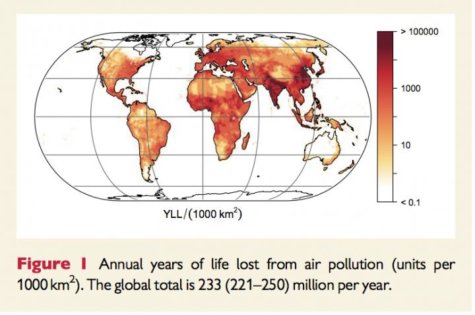MAINZ, Germany — The novel coronavirus is front and center on everyone’s minds these days, but a new international study has come to an alarming conclusion regarding a second major health crisis. There’s another global pandemic we need to all be talking about, and it’s already shortened more people’s lives on a global scale than current wars, violence, malaria, AIDS, and smoking: Air pollution.
Researchers at the Max Planck Institute for Chemistry and the Department of Cardiology at the University Medical Centre Mainz in Mainz, Germany say that air pollution is shortening millions of people’s lives all over the Earth by an average of almost three years. The damage is so extensive, they are calling the smog situation a pandemic.

In 2015 alone, the research team estimate that air pollution caused an extra 8.8 million premature deaths. They came to their findings by using a new method that tracked the effects of numerous air pollution sources on global death rates.
To put these numbers in perspective, tobacco products shorten global life spans by 2.2 years (7.2 million extras deaths annually), HIV/AIDS does the same by .7 years (1 million deaths), and modern violence / wars shorten global life expectancies by .3 years annually (530,000 deaths).
More specifically, air pollution’s influence on six categories of disease was investigated: lung cancer, heart disease, chronic obstructive pulmonary disease, cerebrovascular disease as a precursor to stroke, and other non-communicable diseases like diabetes or high blood pressure. Perhaps predictably, smog most often contributes to cardiovascular diseases, with these ailments accounting for 43% of the estimated premature deaths annually.
Air pollution is also especially harmful for older adults. Besides children under the age of five born in low income nations, 75% of deaths attributed to air pollution occur in people over the age of 60.
“It is remarkable that both the number of deaths and the loss in life expectancy from air pollution rival the effect of tobacco smoking and are much higher than other causes of death. Air pollution exceeds malaria as a global cause of premature death by a factor of 19; it exceeds violence by a factor of 16, HIV/AIDS by a factor of 9, alcohol by a factor of 45, and drug abuse by a factor of 60,” comments Professor Jos Lelieveld, from the Cyprus Institute Nicosia, in a release.
“Since the impact of air pollution on public health overall is much larger than expected, and is a worldwide phenomenon, we believe our results show there is an ‘air pollution pandemic’. Policy-makers and the medical community should be paying much more attention to this. Both air pollution and smoking are preventable, but over the past decades much less attention has been paid to air pollution than to smoking, especially among cardiologists,” explains professor Thomas Münzel.
The study’s authors estimate that if fossil fuel emissions were to cease polluting the air, the average expected global lifespan would increase by just over a full calendar year. If all man-made emissions were to stop, life expectancy would go up by nearly two years.
“In this paper we distinguished between avoidable, human-made air pollution and pollution from natural sources such as desert dust and wildfire emissions, which cannot be avoided. We show that about two-thirds of premature deaths are attributable to human-made air pollution, mainly from fossil fuel use; this goes up to 80% in high-income countries. Five and a half million deaths worldwide a year are potentially avoidable,” Münzel adds.
“It is important that policy-makers and the medical community realize that air pollution is an important risk factor for heart and blood vessel disease. It should be included as risk factor, along with smoking, diabetes and high blood pressure and cholesterol, in the guidelines of the European Society of Cardiology and the American Heart Association on the prevention of acute and chronic heart syndromes and heart failure,” he concludes.
Of course, there are a number of geographical differences in these findings. For example, while East Asia features the highest loss of life expectancy due to avoidable air pollution, African communities are dealing with much larger amounts of unavoidable air pollution caused by dust.
The study is published in Cardiovascular Research.
